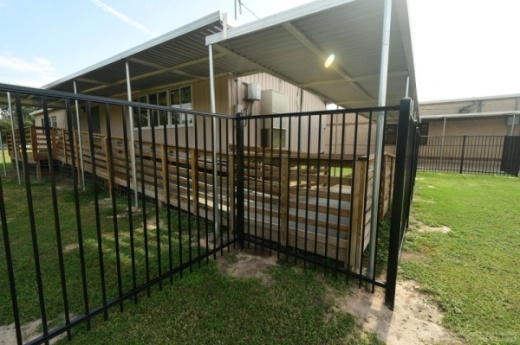This includes an elementary school, middle school, visual and performing arts center, administration building, transportation center and expansions and renovations at other district facilities. Assistant Superintendent of Facilities Matt Morgan provided an estimated timeline of major new construction and renovation plans taking place through 2027 from design phase to substantial completion:
Safety and security updates
More than $200 million of the $1.76 billion bond package Cy-Fair ISD passed in May was designated for safety and security enhancements. The installation of security fencing around elementary school playgrounds and portable buildings throughout the district has been underway for the last several months, according to the district.
The undertaking will cost about $9.5 million by the time crews complete the work, according to district data. Superintendent Mark Henry said in an informational video that it is important to ensure students are safe while in school but continue to allow the community to access district services.
“We have always wanted our community to utilize our playgrounds and open areas after school hours and on weekends,” he said. “However, after some of the recent events that have occurred around the country, we listened to our parents and our schools and are adding fencing to our elementary playgrounds and portable buildings.”
During school hours, campus visitors must check in and go through security screenings at the front office before being granted access to students, officials said. The district’s 2014 bond included impact-resistant glass and secure vestibules at each campus, a project that was completed by the end of 2018.
Another major security project slated to be funded by the 2019 bond is a $118.8 million effort to add walls and barriers around classrooms in open-concept floor plans. Additional card readers on exterior doors, metal detector replacements, additional impact-resistant glass on doors, and enhanced video intercoms and secure vestibules are also included in the plan, among other items.
Paula Ross, the assistant superintendent of technology services and information systems, said a pilot program of VoIP technology—which allows individuals to make phone calls using a broadband Internet connection rather than a standard phone line—has been put in place at the Leonard Brautigam Center.
The pilot will be expanding to one elementary, middle and high school this spring, and she said officials are planning to install phones in classrooms throughout the district by this summer.
In addition to enhancing security through physical initiatives, district officials are increasingly focusing on cybersecurity to protect student and staff data.
This includes network upgrades and the constant monitoring of network traffic throughout the district.
“We’re trying to make sure that students have access to the tools they will be utilizing in the workforce ... and we are protecting our students and their data," Chief Financial Officer Karen Smith said.
According to Smith, the maximum potential debt service tax rate increase over the bond’s seven-year period will be $0.03. This adds up to a $40.50 maximum annual tax increase on a $200,000 home and does not apply to those 65 years and older who qualify for an over-65 exemption.
To find a full update on progress and future plans, visit www.cfisd.net/bond.





